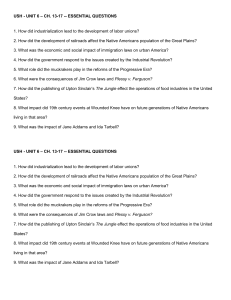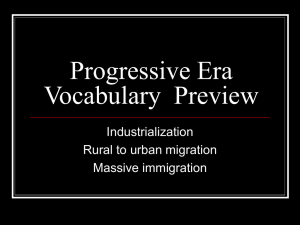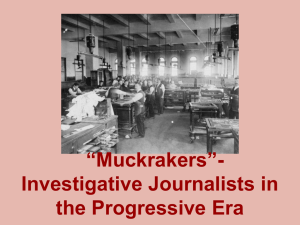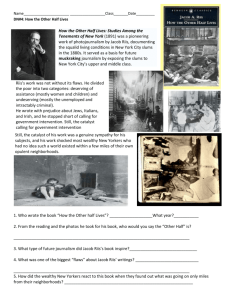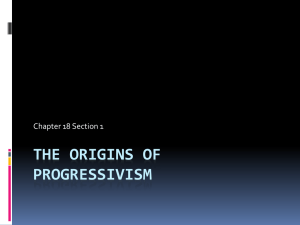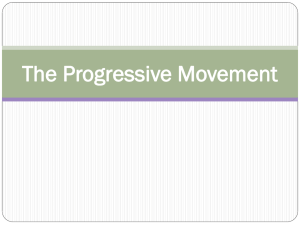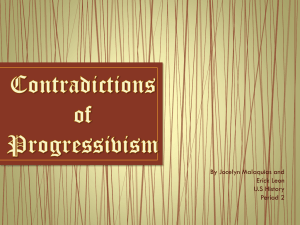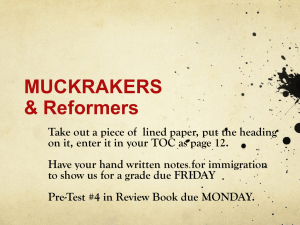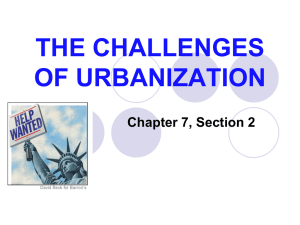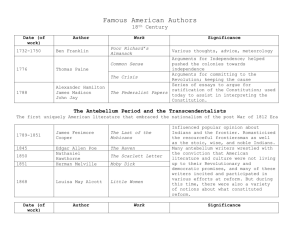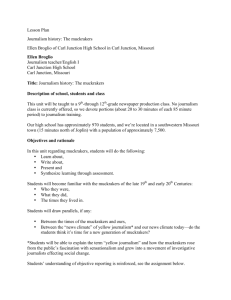Muckrakers Worksheet: Progressive Era Reformers
advertisement
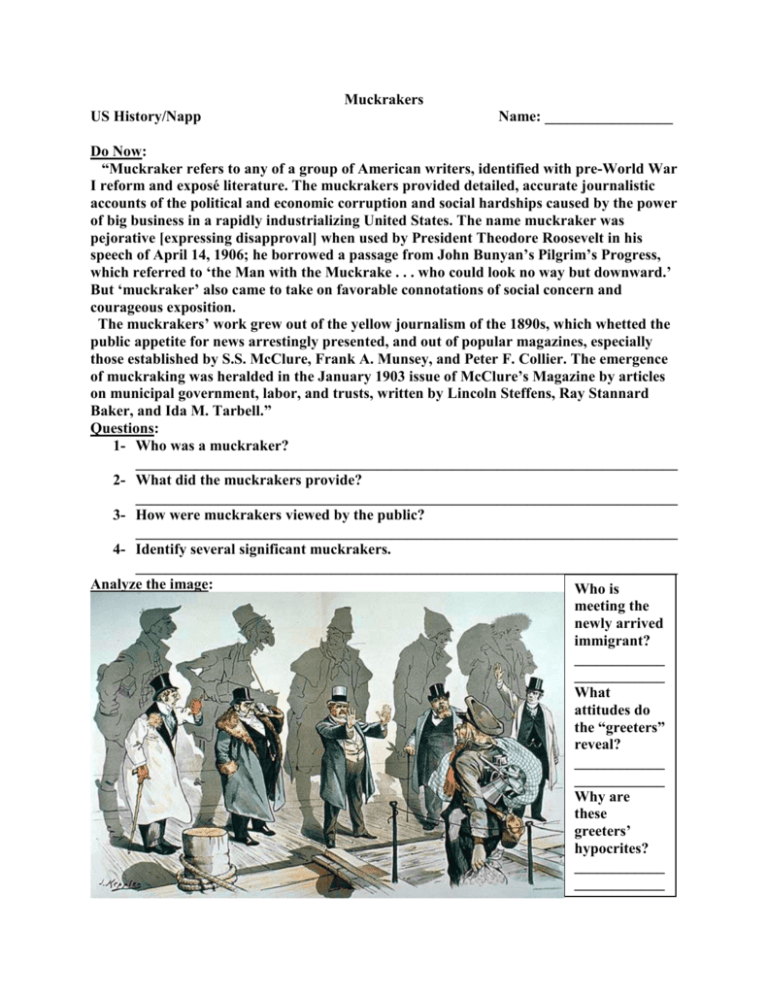
Muckrakers US History/Napp Name: _________________ Do Now: “Muckraker refers to any of a group of American writers, identified with pre-World War I reform and exposé literature. The muckrakers provided detailed, accurate journalistic accounts of the political and economic corruption and social hardships caused by the power of big business in a rapidly industrializing United States. The name muckraker was pejorative [expressing disapproval] when used by President Theodore Roosevelt in his speech of April 14, 1906; he borrowed a passage from John Bunyan’s Pilgrim’s Progress, which referred to ‘the Man with the Muckrake . . . who could look no way but downward.’ But ‘muckraker’ also came to take on favorable connotations of social concern and courageous exposition. The muckrakers’ work grew out of the yellow journalism of the 1890s, which whetted the public appetite for news arrestingly presented, and out of popular magazines, especially those established by S.S. McClure, Frank A. Munsey, and Peter F. Collier. The emergence of muckraking was heralded in the January 1903 issue of McClure’s Magazine by articles on municipal government, labor, and trusts, written by Lincoln Steffens, Ray Stannard Baker, and Ida M. Tarbell.” Questions: 1- Who was a muckraker? ________________________________________________________________________ 2- What did the muckrakers provide? ________________________________________________________________________ 3- How were muckrakers viewed by the public? ________________________________________________________________________ 4- Identify several significant muckrakers. ________________________________________________________________________ Analyze the image: Who is meeting the newly arrived immigrant? ____________ ____________ What attitudes do the “greeters” reveal? ____________ ____________ Why are these greeters’ hypocrites? ____________ ____________ Analyze the chart: “The term ‘Muckrakers’ was first used by President Theodore Roosevelt in referring to a character in John Bunyan’s Pilgrim’s Progress who rejected a crown for a muckrake (a rake used to gather dung into a pile). The term was applied to writers who investigated and attacked social, political, and economic wrongs. Books and magazine articles in McClure’s, Collier’s, and Hampton’s exposed the worst abuses of the period and stirred public outcry against them.” ~ U.S. History and Government Significant Muckrakers Upton Ida Tarbell: Lincoln Frank Norris: Jacob Riis: Sinclair: - America’s first Steffens: - Novelist great woman - Wrote (1901), - a police reporter journalist - a journalist, The Octopus, whose work - Best-known lecturer, and described the appeared in novel, “The - Her most political struggle several New York Jungle” famous work, philosopher, a between newspapers, The History of leading figure farming and documented the - Expose the the Standard Oil among the railroad living and appalling and Company writers whom interests in working unsanitary Theodore California conditions of the conditions of - She revealed Roosevelt called poor the meat the illegal means muckrakers - In August inspection used by John D. 1902, - Wrote How the Rockefeller to - Published Everybody's Other Half Lives - If a worker’s monopolize the stories of Magazine finger was cut early oil corruption in published an - Jacob Riis wrote off by the meat industry major American article by and lectured on grinding cities Norris, A Deal the problems of machine, the - Yet did praise in Wheat, the poor human finger Rockefeller for - These exposing was ground his enormous sensational corrupt - He had exposed into the meat accomplishments account stirred business landlords and and sold in organizing popular concern dealings in officials in and stabilizing a agriculture articles, books, - Influential in volatile industry and public obtaining speeches, and passage of the with results Pure Food and Drug Act 1- What novel is Upton Sinclair best remembered for? ________________________________________________________________________ 2- What horrifying truth did this novel reveal? ________________________________________________________________________ 3- What was this novel influential in obtaining? ________________________________________________________________________ 4- Why is this act significant? ________________________________________________________________________ 5- Who was Ida Tarbell? ________________________________________________________________________ 6- What book did she write? ________________________________________________________________________ 7- What did the book reveal? ________________________________________________________________________ 8- What did the book praise? ________________________________________________________________________ 9- Who was Lincoln Steffens? ________________________________________________________________________ 10- What did he publish? ________________________________________________________________________ 11- What did Frank Norris write in 1901? ________________________________________________________________________ 12- What did Frank Norris expose? ________________________________________________________________________ 13- Who was Jacob Riis? ________________________________________________________________________ 14- What did Jacob Riis write? ________________________________________________________________________ 15- What did Jacob Riis expose? ________________________________________________________________________ 16- Why were Muckrakers important in American History? ________________________________________________________________________ 17- How did Muckrakers change American History? ________________________________________________________________________ 18- Do you view Muckrakers favorably? ________________________________________________________________________ 19- Explain your view of Muckrakers. ________________________________________________________________________ 20- Are Muckrakers needed today? ________________________________________________________________________ 21- What issues would Muckrakers expose today? ________________________________________________________________________ 22- How could Muckrakers today change American policies or laws? ________________________________________________________________________ Children Sleeping in Mulberry Street (1890) Photograph by Jacob Riis What does this photograph reveal about conditions for the poor in New York City? _____________________________________________________ _____________________________________________________ _____________________________________________________ _____________________________________________________ 1. Progressive Era authors such as Jacob Riis and Upton Sinclair are best known for (1) focusing attention on social conditions (2) fighting for the civil rights of African Americans (3) promoting the interests of the American farmer (4) supporting the goal of woman’s suffrage 5. During the Progressive Era, Jane Addams responded to urban conditions by working to establish (1) settlement houses that provided assistance to the poor (2) newspapers that helped to inform Americans about slum conditions (3) laws that restricted certain immigrant groups (4) free public schools located in inner-city neighborhoods 2. In 1906, the publication of The Jungle, written by Upton Sinclair, led Congress to (1) enact stronger prohibition laws (2) support the national conservation movement (3) establish a system for meat inspection (4) legalize strikes and boycotts by labor unions 6. Passage of the Pure Food and Drug Act and the Meat Inspection Act illustrated the federal government’s commitment to (1) environmental conservation (2) workers’ rights (3) business competition (4) consumer protection 3. During the Progressive Era, muckrakers published articles and novels primarily to (1) advance their own political careers (2) make Americans aware of problems in society (3) help the federal government become more efficient (4) provide entertainment for readers 4. Jane Addams and Jacob Riis were most notable for their efforts to (1) treat the wounded in World War I (2) stop the spread of diseases in Latin America (3) legalize birth control for women (4) aid the urban poor 7. Muckrakers contributed to the rise of Progressivism in the early years of the 20th century by (1) challenging big government and urging a return to past conditions (2) exposing widespread corruption in business and government (3) writing favorable biographies about wealthy Americans (4) aligning themselves with the women’s suffrage movement 8. In How the Other Half Lives, Jacob Riis described the living conditions of (1) workers in urban slums (2) African Americans in the segregated South (3) the rich in their mansions (4) Native American Indians on reservations Excerpt from Upton Sinclair’s The Jungle (1905), chapter 9: ~ gmu.edu “There were the men in the pickle-rooms, for instance, where old Antanas had gotten his death; scarce a one of these that had not some spot of horror on his person. Let a man so much as scrape his finger pushing a truck in the pickle-rooms, and he might have a sore that would put him out of the world; all the joints in his fingers might be eaten by the acid, one by one. Of the butchers and floorsmen, the beef-boners and trimmers, and all those who used knives, you could scarcely find a person who had the use of his thumb; time and time again the base of it had been slashed, till it was a mere lump of flesh against which the man pressed the knife to hold it. The hands of these men would be crisscrossed with cuts, until you could no longer pretend to count them or to trace them. They would have no nails, - they had worn them off pulling hides; their knuckles were swollen so that their fingers spread out like a fan. There were men who worked in the cooking-rooms, in the midst of steam and sickening odors, by artificial light; in these rooms the germs of tuberculosis might live for two years, but the supply was renewed every hour. There were the beef-luggers, who carried two-hundred-pound quarters into the refrigerator-cars; a fearful kind of work, that began at four o’clock in the morning, and that wore out the most powerful men in a few years. There were those who worked in the chilling-rooms, and whose special disease was rheumatism; the time-limit that a man could work in the chilling-rooms was said to be five years. There were the woolpluckers, whose hands went to pieces even sooner than the hands of the pickle-men; for the pelts of the sheep had to be painted with acid to loosen the wool, and then the pluckers had to pull out this wool with their bare hands, till the acid had eaten their fingers off. There were those who made the tins for the canned-meat; and their hands, too, were a maze of cuts, and each cut represented a chance for blood-poisoning. Some worked at the stamping machines, and it was very seldom that one could work long there at the pace that was set, and not give out and forget himself, and have a part of his hand chopped off.” Questions: 1- Identify seven significant facts about the workers Upton Sinclair is describing in The Jungle: ________________________________________________________________________ ________________________________________________________________________ ________________________________________________________________________ ________________________________________________________________________ ________________________________________________________________________ ________________________________________________________________________ ________________________________________________________________________ 2- What does this passage reveal about working conditions? ________________________________________________________________________ ________________________________________________________________________ ________________________________________________________________________ 3- How might this passage shape public opinion? ________________________________________________________________________ ________________________________________________________________________ Analyze the images: What is the main idea of the cartoon? ___________________________________________________________________________ What is the main idea of the cartoon? ___________________________________________________________________________
